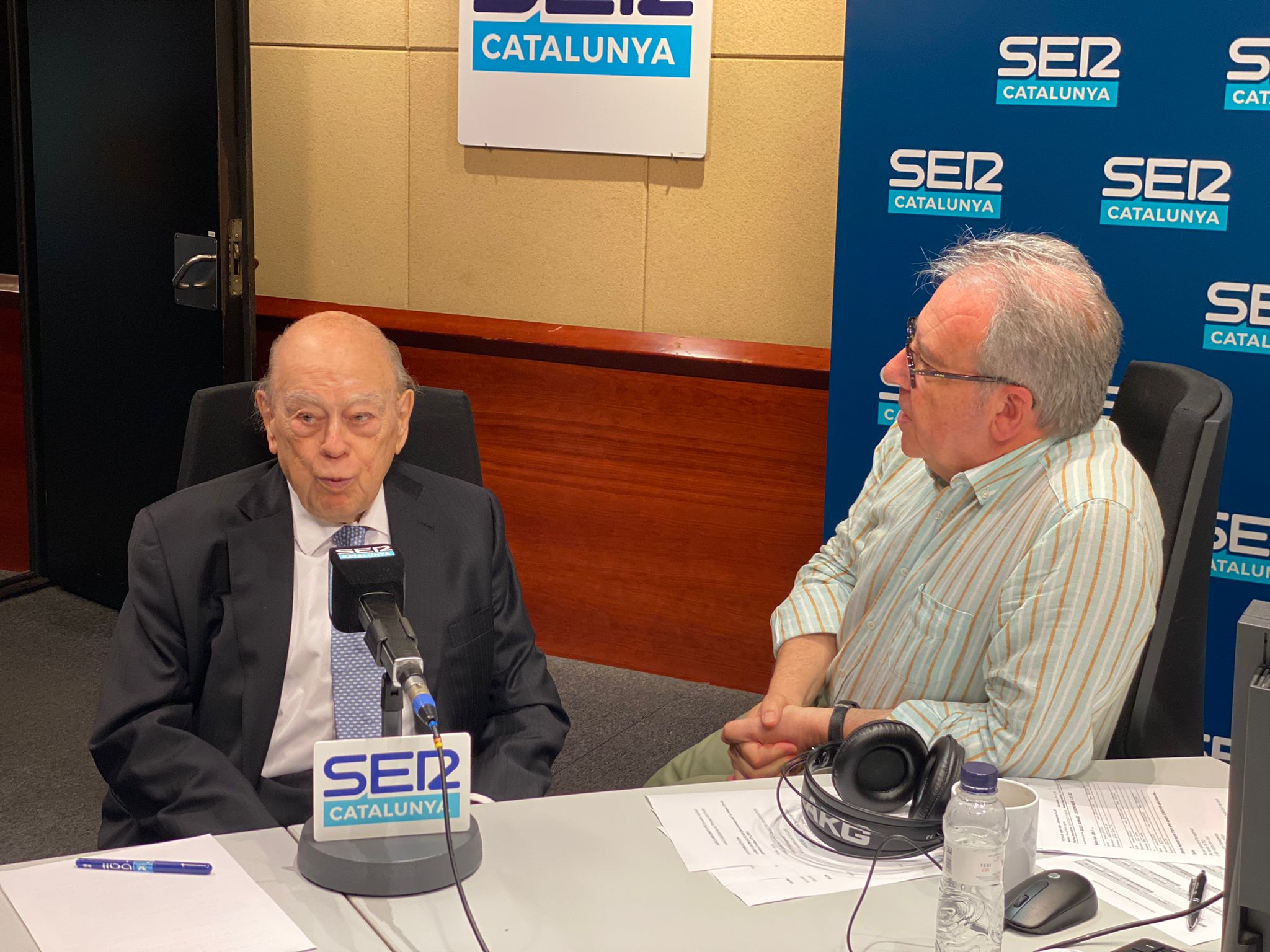The former Catalan president Jordi Pujol has once again stepped into the public eye and given a live interview on Catalan radio, a far more open communication than other previous written statements, such as the interviews which a year ago led to the book Entre el dolor i l'esperança ("Between pain and hope") by Vicenç Villatoro. The 92-year-old president, who has avoided almost all public appearances since his 2014 confession over an undeclared inheritance, reiterated as many as three times that this radio interview was an exception, which he made for the farewell of well-known journalist Josep Cuní from his programme Aquí Cuní on the SER Catalunya network: "Now they tell me that Cuní is retiring, it turns out that they fooled me a little. But if Cuní is retiring, I'll be there because I wanted to thank him for what he's done and here he has me."
And from there, sixty minutes of conversation in which Pujol once again gave an authentic history lesson. A few long pauses that turned into complicit radio silences - and his obsession with repeating that he was losing his memory. But his own words gave the lie to that: he reviewed the current NATO crisis, he compared Russia to Spain, talked about the concept of 'empty Spain' and, finally, took the temperature of Catalonia. "The country is sad and besides all that there is a confusion. I do not want to be critical of anyone, if things have not been done well enough, it is because of everyone," said Pujol, beginning his perspective on the current vision of his country. He continued: "Politically, I'm sorry to say this, but it's clear that we're not functioning well. It's also true that Spain has a very negative attitude, but many times it has had this and we have to expect it and overcome it, and I hope that happens."
🔴 EN DIRECTE | @JosepCuni entrevista a Jordi Pujol
— Aquí Cuní (@AquiCuni) July 1, 2022
📻 https://t.co/YkETtnKW28 https://t.co/HQW2ZUuv6G
Link to the interview in its entirety (with video): Jordi Pujol speaks to Josep Cuní on SER Catalunya.
Catalonia, in an "untidy" condition
He didn't mention even one single name of a political leader, either Catalan or Spanish. But in general, Pujol was also very precise with everything he wanted to say. "We have the country in a very untidy state." "Do you know that sometimes there are houses that are untidy because they have been abandoned for a while? So first, what needs to be done is to tidy up the house. And the house, in this case, is politics. This has to happen with current politicians." And in this critique, he also gave the other side of the coin: "There are two visions, the politics of Catalonia that is going through a difficult time, but in spite of everything, also the positive side of the country and that it is alive. If we see the politics of Catalonia we might be a little discouraged, but on the other hand, if we see the Catalan economy, exports or research, we are in a good situation or better than before. We cannot give up hope."
"I'm 92 now and I wouldn't be surprised if I lived five or six years"
Speaking of his own role in first-person, he did not exclude himself from a share of the blame for the negative side of current politics: "Of course I feel responsible, but that doesn't mean I accept that nothing is in good shape in this country. A lot was done, and right now, Catalonia, in many ways, is better than it seems. Just yesterday, a very important scientist whose name I will not give, made me realize." Journalist Josep Cuní asked him what role he saw for his current contribution to the country and Pujol answered with an honesty that was too direct. "My time has passed. Now I'm 92 and I wouldn't be surprised if I lived another five or six years, so I'm not too keen. Now it's not my time [to get involved]." Displaying remarkable inspiration and mental agility, he threw in touches of humour: "Someone once said 'Either it's your time or it's not', because that's all there is to it." And from humour he also moved on to seriousness in a matter of seconds: "Death respects me. I am a good Christian. Now I don't have the strength I had before, but I hope to regain it."
Beyond Catalonia, the president asked "never to disregard history" because it is through it that much can be understood. "There is nothing there that makes me think of independentism. I have always been knowledgeable about the history of Spain. And this goes back to Asturias and the texts that were written in its court in the tenth century. In the court of Asturias, when a new king had to be chosen, Don Pelayo and others that followed successively, something that they made them swear there in Asturias, secretly among the rocks, was to propose and achieve the reconquest of Toledo, the Visigothic capital. So this comes from a long way back, do I make myself clear or not? The story of the reconquista is based on this, everything that moves away from this possibility will be persecuted." And Cuní replied: "You moved away from it and you were persecuted." Pujol answered, but with another silence.

